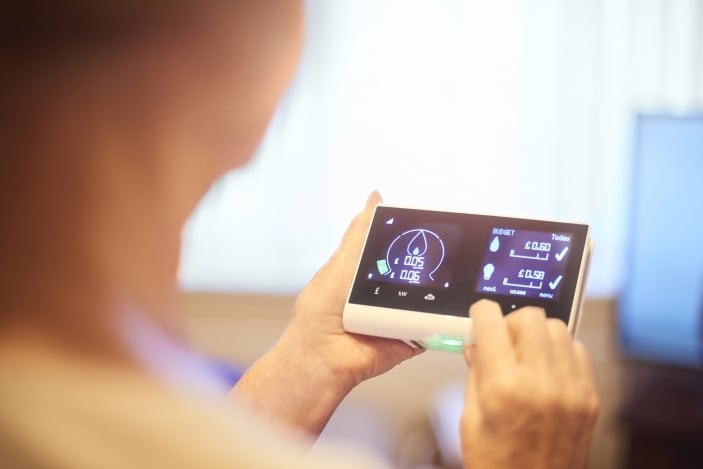Although problematic, the benefits of residential smart meters, coupled with connected appliances, are without question. But their application is triggering significant debate within the power sector surrounding data use and what protections consumers may need in the future.
A recent briefing organised by the Energy Networks Association, which sought to analyse how Britain’s consumers could benefit from the Internet of Energy, brought those topics to the fore. Conservative MP James Heappey implored energy companies to “start back at the consumer”, indicating his belief that the wider decentralised generation and networks piece starts first and foremost as a behind-the-meter (BTM) project. And he may not be wrong. Decentralisation doesn’t work without, well, decentralised generation, with rooftop solar PV, domestic batteries and electric vehicles emerging as the cornerstone of the future power demographic.
And it’s this evolution that spells danger for traditional energy companies. Heappey signalled a warning for utilities that there were entities outside of the energy sector waiting to usurp the consumer-facing role energy companies currently enjoy. “Somebody like a comms company or a Big Data company, or some challenger we’ve not yet seen,” Heappey says, are waiting in the wings to come in and reduce this role to that of a B2B player.
As a result, consumers stand to find value, comfort and, perhaps most enticingly, control, Heappey says. Until now, suppliers have had it easy. A consumer flicks a switch, and the supplier bills them for the amount of power consumed until that switch is flicked again. Either bills hit the doormat on a regular basis, or someone tops up a pre-pay meter.
But more rampant decentralisation promises to upend that model. Generating more than you need? Store it in a battery. Need something of a top-up? You can draw from the grid, or draw from your neighbour’s or possibly a communal battery at a fraction of the cost. Or just use what’s left in your car battery for now, allowing that piece of the puzzle to recharge overnight during Economy 7 pricing.
Such a premise grows even stronger when you consider the level and density of data that stands to be collected from consumers in the new energy age. But, equally, that data comes with a significant burden.
Knowledge is power
“Once you have [Google] Alexas in every room and sensors all over the place that are constantly watching… and those sensors are learning things about how you lead your life, [things] that are extraordinarily invasive and clearly have huge value to advertisers… whilst giving consumers that functionality you also have to protect them,” Heappey said.
Speaking at the same event, Citizens Advice principal policy manager Stew Horne also questioned data requirements. “What are we asking consumers to share? Data underpins a lot of the services of the future, but it’s the consumer’s data at the heart of it, so we have to be really sensitive and do it in a way that benefits consumers,” he said.
Data collected by smart meters, connected appliances, EVs and everything else offers substantial use to an energy economy that must do its damnedest to decarbonise. That much is true. Entire business models, most notably those professing to offer ‘energy as a service’ rather than as a commodity are very much built around a supplier’s capability to overhaul the energy efficiency of properties and/or businesses and make it their duty to bring that consumption down.
But in a climate where consumer data and more specifically data ownership has taken centre stage, to what extent can corporate energy companies be trusted to collate and use it responsibly?
In July, energy regulator Ofgem allowed DNO Western Power Distribution to access half-hourly consumption data from smart meters in a move which was broadly welcomed. Although the respective dataset would have its limitations, the news was still celebrated by the ENA’s head of innovation Randolph Brazier who, writing for Current±, noted its potential to further develop demand-side response (DSR) technologies and make better informed decisions over distribution network reinforcements.
Given its potential use for good, at what point should such data sharing be allowed? And, crucially, given recent headlines over Facebook’s data mining operations and how that data has been utilised by third parties with rather suspicious motives, to what extent will consumers allow it to happen?
That very much remains to be seen, but the answer could lie in the future make-up of the supply sector in general. Rarely a day goes by without the likes of Facebook, Amazon, Apple and a whole host of other corporate giants being linked with a move into the energy game. Those companies have become experts at the collation and interpretation of data of mammoth proportions, using it to tailor their products to specific users. Laura Sandys, who was due to speak at the ENA event until withdrawing, tells a good tale of one existing energy supplier proudly remarking how they had around 10 points of data on users, which helped them understand certain behaviours. They were then shocked to hear Amazon had hundreds.
Should that blurring of the lines between retailer, tech giant and energy supplier occur, Heappey is adamant that the regulator’s lines may have to blur with them. Ofgem, Ofwat and Ofcom may be “too siloed” to meet the needs of these emerging industries he said, pitching a so-called ‘Ofbundle’ as the watchdog of the future.
Whatever the nature of energy’s digital future, it’s abundantly clear that not only will data play a central role, but that the precise means of collection, use and interpretation of that data is unclear. Furthermore, it is likely to become a legislative issue not just for energy companies, but for the regulators and policy makers themselves. Until such a time that clarity is issued, expect data to continue to be something of a grey area for energy firms.






